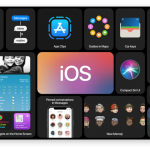
All Apple's upcoming innovations for iPhone and Mac
Unveiled during the 2020 WWDC
June 23rd, 2020
The live streaming of the 34th edition of the WWDC (Worldwide Developers Conference), the annual conference of software developers hosted by Apple, was broadcast on Monday, June 22nd, 2020. This year the event took place only online due to the COVID-19 emergency, but that did not mean a lack of announcements: CEO Tim Cook unveiled a series of implements and innovations that, starting from autumn, will involve all Apple technology (from the iOS 14 mobile operating system, up to iPadOS, macOS, to watchOS).
Here's everything that has been announced.
Apple iOS 14

The new version of the operating system for iPhones and iPads will undergo capital changes. The set of features will not only improve the functionality of the system but will make the Home Screen customizable as it has never been before. This is the most invasive update in the history of Apple Home Screen.
App Library. The first, big news will allow apps to automatically organize themselves according to their categories, completely changing the iPhone interface. In this way, it will be possible to choose how many pages of the Home Screen to display, but more importantly which ones to hide to access more quickly the App Library (which will appear at the end of all the Home screens). From the settings, users could also choose whether to add apps on the Home screen or only in the App Library.

Widget. Widgets are all those components that provide information about the apps or that allow users to quickly perform actions without opening the app in question. To be clear: they are all those windows that until now only appeared on the Today screen (swipe left). With the new update, these widgets will be integrated directly into the Home Screen among other applications and could even be grouped into a particular type of widget that collects all the other widgets (Smart Stack). All widgets will automatically change over the course of the day.
Picture in picture. Just as it already happened with iPads, iOS 14 will support the function that allows users to watch videos while doing other operations on the smartphone (not different from what already happens on YouTube or WhatsApp). The video could be resized and moved on the screen.
Calls. The same picture in picture function will also make calls even more multi-tasking: both traditional and FaceTime calls will have a new compact design that will not occupy the whole screen but will allow users to continue the activities that they were doing before they answer.
Siri. Still, in the wake of multi-tasking, Siri will also appear in a new screen and will be represented only by a floating icon, superimposed on the screen in use. The responses, therefore, will not occupy the whole screen but will appear as notification boxes at the top of the screen.
Translate. Among the news, there is also a new app: Translate, that is basically Apple's answer to Google Translate. The app will be integrated with Siri and will allow users to automatically translate any conversation. It will also work offline. The languages available will be 11: English, Mandarin Chinese, French, German, Spanish, Italian, Japanese, Korean, Arabic, Portuguese and Russian.
App Clips. Basically like some small demos: Clips consist in only some parts of the apps that will allow users to perform specific functions without the need to download the apps in question (neither purchase nor full download them). To access these features, it will be enough to simply scan an App Clip code developed by Apple, an NFC tag or a QR code. This way, it will be possible to rent a bicycle, participate in a car-sharing, pay for a coffee at the bar without the need to download the apps that allow all these functions.
Apple Maps. There is some news that regard Maps, too: in addition to some geographic updates (improvements on Great Britain, Ireland and Canada), the Guide function will be introduced. City guides will offer a detailed list of all the places to visit and activities in the surroundings of the interested area. A function dedicated to cyclists has also been added, initially available only in some cities; then another for electric cars, with itineraries that include charging stations. Finally, Apple Maps will also show the presence of traffic lights and speed cameras.
CarKey. It's official: iPhone will turn into a real digital key to unlock and start compatible cars, which can also be shared with family and friends. The owner could decide which of the three access levels to unlock: only the trunk, only the doors or full access to the car (including starting). The first car to support CarKey will be the BWM M5 due out in 2021.
Various. Finally, among the various updates, the features of the Camera, Health App, Weather App have been implemented and privacy policies have been improved. Then a new function to has also been introduced to track down any user's Apple devices and accessories. Finally, just as happens on the PC, with iOS 14 user can choose the default app: for example Chrome as the default browser instead of Safari, or Outlook instead of Mail.
macOS Big Sur
Together with the updates of the iOS 14 operating system, Apple has also revealed the new version of macOS, the operating system for PCs: macOS Big Sur.
The most striking news undoubtedly concerns the look: Big Sur will introduce the largest re-design from the time of macOS 10. The new operating system borrows several elements from the iOS system, especially for the new Control Center that features a new function for brightness adjustment, the Do Not Disturb option and others chosen by each user. In addition, there is also a new Notification Center, which will group all the notifications into a single column, in chronological order from most to least recent. Finally, the menu bar is higher and the colour of the interface font will change according to the background colors. In general, everything will be more rounded and translucent.
The Messages app will undergo several changes, including the addition of various features already present on iOS such as discussions, group messages, the ability to mention and block conversations.
The macOS Big Sur Maps will also update like those of iOS 14, with the addition of the Guides functionality and the possibility of creating customized itineraries. In addition, the Look Around feature will allow you to have a 360° view of the places concerned. Also, detailed maps of the interiors of airports and shopping centres have been added.
Still, the biggest improvement will regard Safari, the default browser of the macOS operating system: the improvements in terms of performance will make it up to 50% faster than Android's Chrome. Another new feature is the support for extensions, which will be available through download from the Mac App Store. Also, Safari has been improved in terms of privacy and security. Finally, Apple announced the addition of an integrated translator, which will allow you to translate entire web pages with a click, as well as a new customizable home page and a redesigned card management system.
At the end of the conference, therefore, the most awaited announcement finally arrived: after months of speculation, Apple confirmed the passage of the Macs to the Apple Silicon processors. A very important innovation regarding the technological but above all industrial and productive future of the company. The partnership with Intel for the moment is abandoned, in favour of a processor that can be designed "at home", as it is happening for years now with iPhones and iPads. Tim Cook specified that - at least for now - Macs equipped with Intel CPUs will not disappear from the market since there is still no release date for the first MacBook or iMac with Apple Silicon processor. The debut, however, should take place later in the course of this year.
Both the iOS 14 preview and the macOS Big Sur previews are available on the official Apple website.





































.jpg)











.jpg)














































